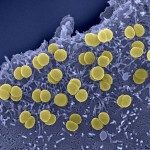Lien vers Pubmed [PMID] – 24485864
Arch Pediatr 2014 Mar;21(3):258-64
OBJECTIVES: We used data from the Groupe de pathologie infectieuse pédiatrique and Association clinique et thérapeutique infantile du Val-de-Marne (GPIP/ACTIV) National Survey of Bacterial Meningitis in children and the National Reference Center for Meningococci (CNRM) microbiological data to assess the potential impact of corticosteroids on the immediate management of invasive meningococcal disease (IMD) associated with different genotypes, including highly pro-inflammatory strains of the ST-11 clonal complex (genotype ST-11).
METHODS: From 2001 to 2009, 259 pediatric wards and 168 microbiology laboratories distributed throughout France prospectively included all under-18-year-old patients with IMD (meningitis or purpura fulminans). The strains were sent to the CNRM for genotyping. We linked the ACTIV clinical data of IMD cases, where information on corticosteroid therapy was available, to strains isolated by the CRNM.
RESULTS: A total of 1981 IMD cases were identified during the 8-year study, 805 cases (712 [88.5%] bacterial meningitis and 93 [11.5%] purpura fulminans) had steroid treatment data (33.8% received corticosteroids). The genotype of the strains was available for 410 patients (24.4% related to genotype ST-11; 100 patients). For all cases and regardless of the corticosteroids, mortality was significantly associated with the genotype ST-11 (OR=2.39, 95% CI [1.29; 4.42], P=0.004). For all cases and regardless of the genotypes of the isolates, mortality was also significantly higher for children with than without corticosteroid therapy (12.7% versus 4.5%, P<0.001). However, this treatment had been prescribed more frequently in severe cases, including shock, PF, coma and/or mechanical ventilation. For children who did not receive corticosteroids, the mortality rate was significantly higher with genotype ST-11 compared to other genotypes (OR=4.68 [1.91, 11.46], P=0.001). This difference disappeared in children who received corticosteroids.
CONCLUSION: This study indicates that in the absence of corticosteroids, higher mortality in invasive meningococcal disease is associated with the ST-11 clonal complex strains. This suggests a possible positive effect of corticosteroid therapy depending on the genotype of the strain involved.

